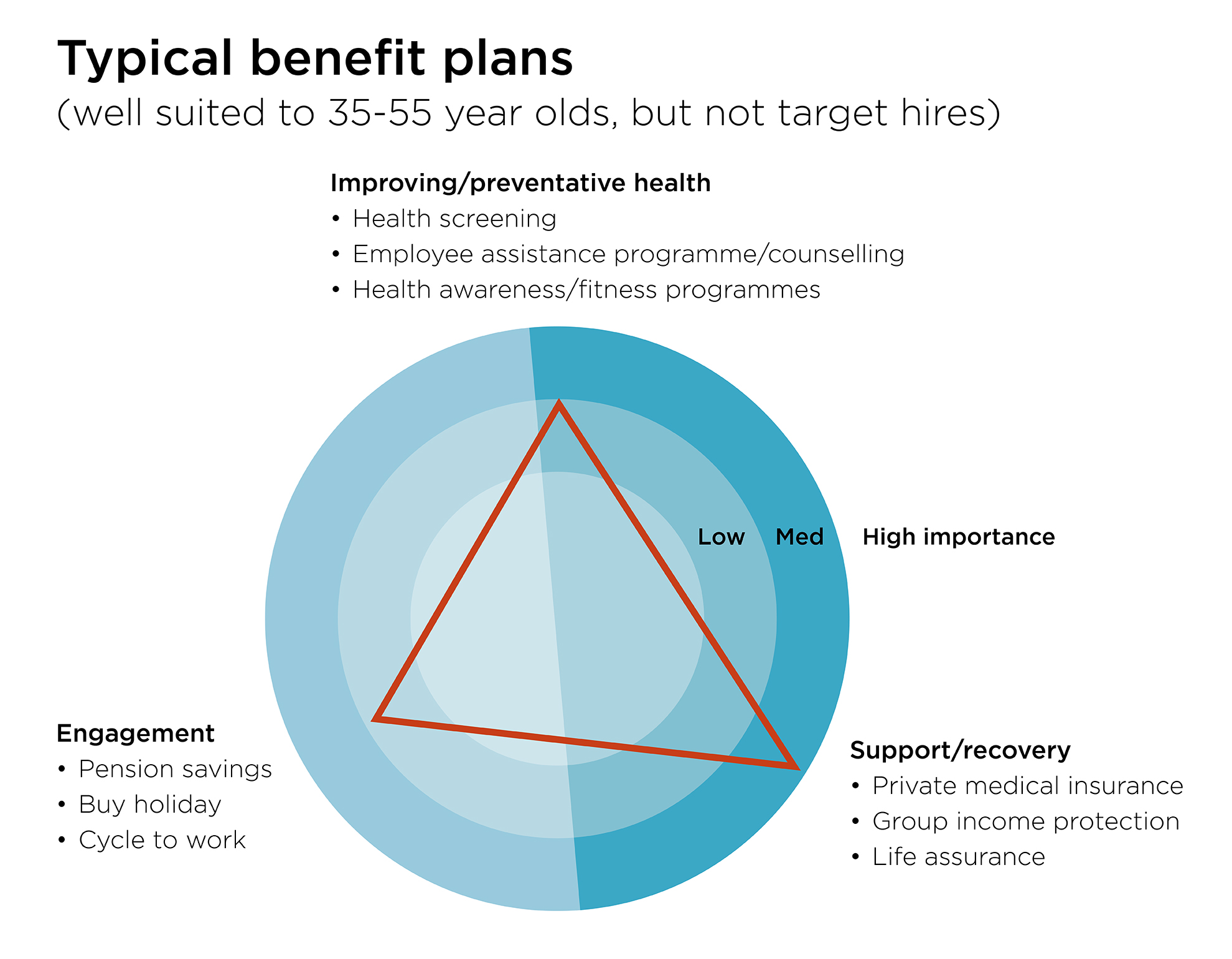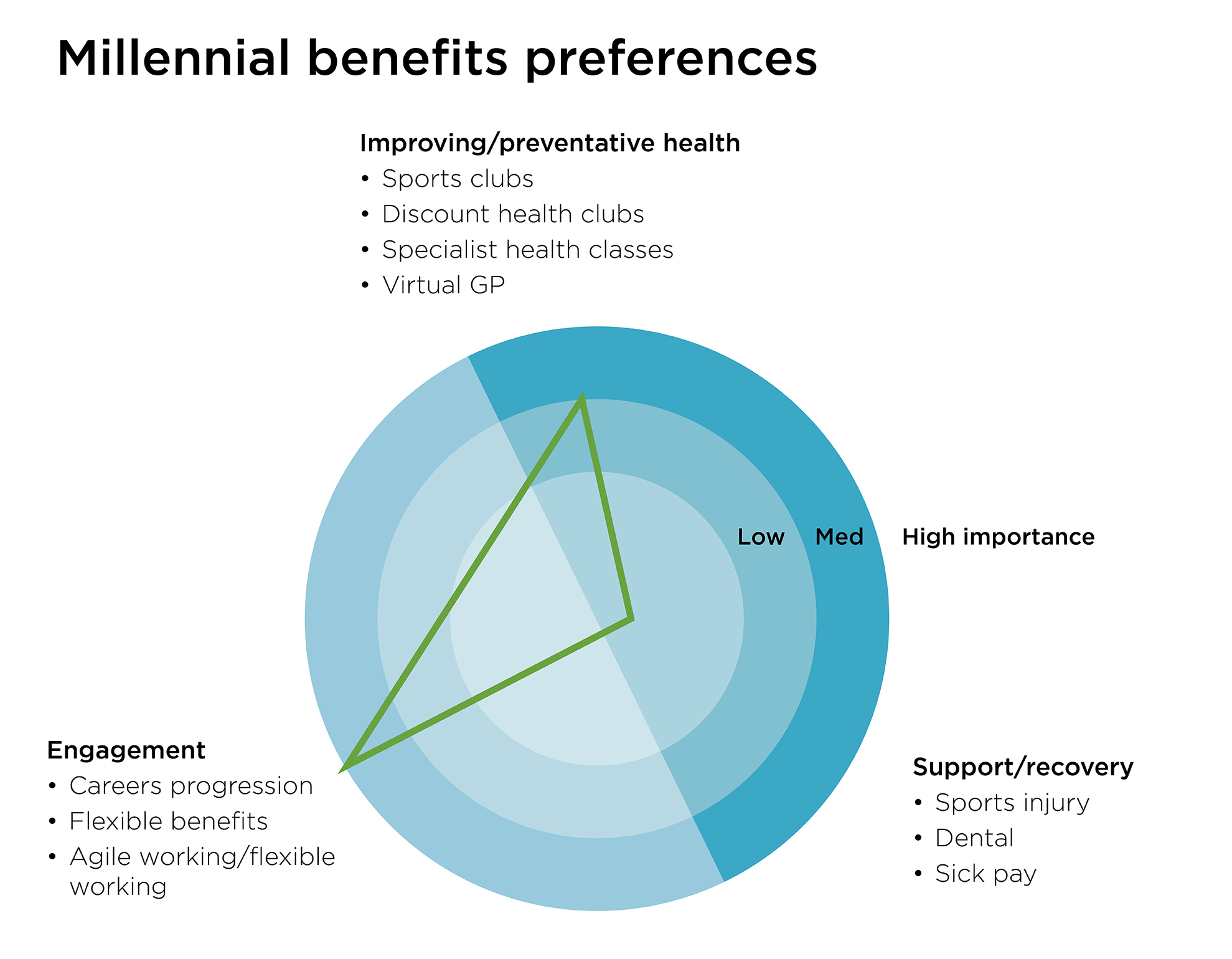For companies serious about attracting and retaining younger workers, it might be time to re-evaluate their benefits package.
Companies’ recruitment and retention of millennials will only become more important.
In future this group (those born between 1977 and 2000) will become an ever-greater determinant of companies’ overall commercial success. By 2025 75% of office workers are projected to be millennials (opens a new window), according to one Deloitte survey.
There is often a vast difference between what millennials value in a workplace and what most employers offer.
So how does an employer provide a workplace and benefits package attractive to millennials? The first step, simple as it sounds, is understanding what this age group actually wants from work.
Times are changing
Decisions-makers within companies and HR departments are usually not millennials. As a result, they may often be well-removed from the trends and circumstances influencing millennials’ lifestyles, working patterns and preferences. So how would they really know what millennials want?
With this in mind, we went back to basics and asked millennials themselves what they wanted in a workplace (running a number of tailored, focused groups using paired comparisons (opens a new window) to establish popularity levels).
Our findings suggest there is often a vast difference between what millennials would look for and value in a workplace, and what most employers offer.
In our experience, many company benefits programmes have remained largely unchanged over the past 20 years (and competitor benchmarking only reinforces this position). They tend to be suited (on average) to 35-55 year olds and are heavily weighted towards support/recovery benefits.


Many company benefits programmes have remained largely unchanged over the past 20 years.
According to our research, millennials’ preferred benefits package is weighted far more towards ‘engagement’, with much less emphasis on support/recovery benefits.
For instance, our research indicated that, rightly or wrongly, retirement doesn’t feature as major consideration for millennials – with only 4% of 16-24 year olds attracted to an employer because of their pension plan.
On the other hand, lifestyle benefits are a big attraction – with holiday trading, access to retail and travel discounts and agile/flexible working all featuring highly in our pilot studies.
Short and simple
Changing your actual benefits package by itself may not be enough to attract and retain millennials, however, unless these benefits are communicated effectively. There can often be large differences in how older employees and millennials prefer to access and consume information.
There can be large differences in how older employees and millennials access and consume information.
Millennials are more likely to expect information and decisions around benefits to be presented and actionable on multiple channels and devices. They will also tend to respond better to short, crisp and personalised communications (opens a new window).
For instance, more than two thirds of millennials believe there is a place for emoticons in the office, according to a new study from Microsoft and YouGov (opens a new window). This is not to say that information on pensions should be accompanied by smiley faces, but it does indicate broader differences in how many millennials prefer to communicate – something employers should cater for, where appropriate.
Case by case
Of course, not all millennials are the same and we should avoid generalisations about any work group. Many traditional conceptions of millennial employees (opens a new window)are being quite routinely questioned and/or refuted by data.
Many traditional conceptions of millennial employees are being questioned.
Our research findings are only an average of the group we looked at. Our research indicates that there is a wider dispersion among millennials than among older age groups. Partly, this may because of the speed of change (most notably technological) that has occurred in the last decade, during which many of millennials have reached adulthood and entered the workplace. There will inevitably be sub-groups within the millennial category. Understanding and factoring in this variability is vital to understanding what millennials may want.
And, naturally, these findings only indicate what millennials have said they would like, not what may reasonably be considered in their best interests. For example, while millennials may not consider pension provisions as a big factor – because retirement seems so far away, of course they are vitally important and something that responsible HR professionals would consider within a broader benefits package.
Join us at our Lockton Breakfast Seminar – 'Engaging the Multigenerational Workforce' – where we will share findings from our research and experience about how employers can effectively address the needs of a multigenerational workforce.
RSVP: locktonbenefits@uk.lockton.com (opens a new window)
2 November 2017, 08:15–10.00
Location: Lockton Companies LLP, The St Botolph Building, 138 Houndsditch, London, EC3A 7AG
For more information, please contact Mike Tyler on:
Tel: +44 (0)20 7933 2773 | Email: mike.tyler@uk.lockton.com (opens a new window)

